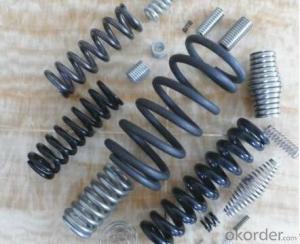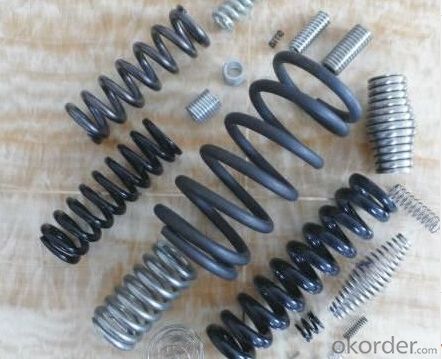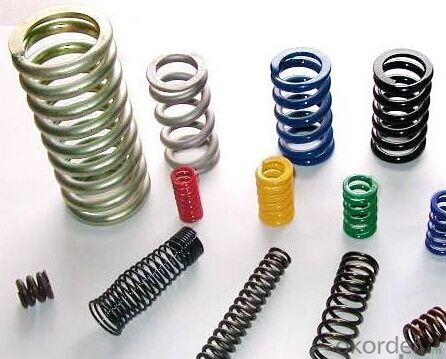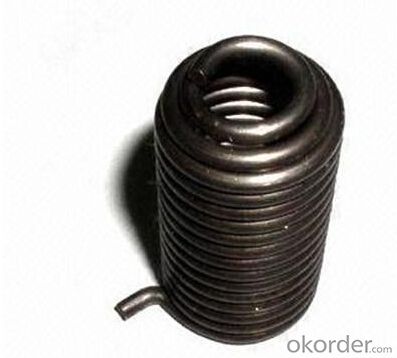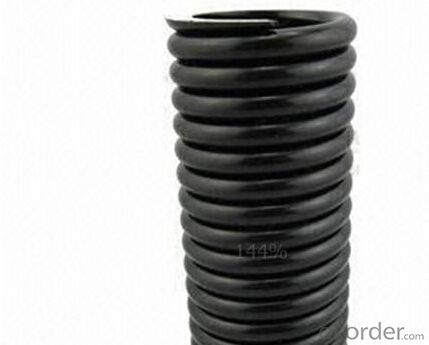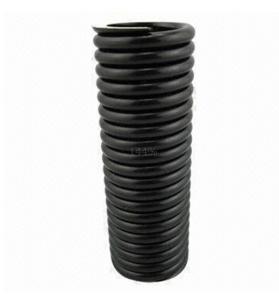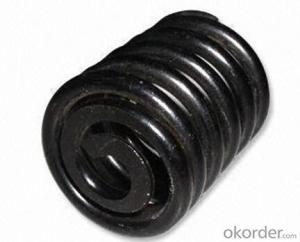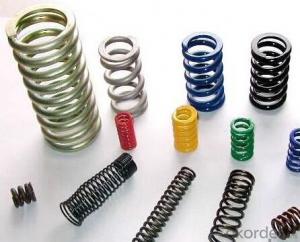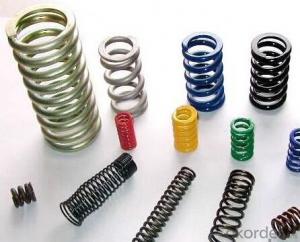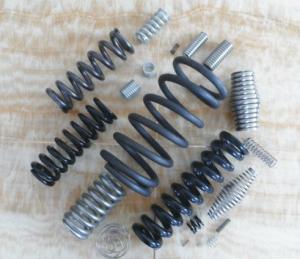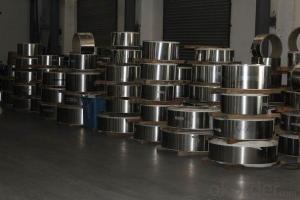Compression Spring Heavy Duty with Stainless Steel
- Loading Port:
- China Main Port
- Payment Terms:
- TT or LC
- Min Order Qty:
- 50 m.t.
- Supply Capability:
- 1000 m.t./month
OKorder Service Pledge
OKorder Financial Service
You Might Also Like
Product Description:
OKorder is offering Compression Spring Heavy Duty with Stainless Steel at great prices with worldwide shipping. Our supplier is a world-class manufacturer of steel, with our products utilized the world over. OKorder annually supplies products to European, North American and Asian markets. We provide quotations within 24 hours of receiving an inquiry and guarantee competitive prices.
Product Applications:
Compression Spring Heavy Duty with Stainless Steel are ideal for structural applications and are widely used in the construction of buildings and bridges, and the manufacturing, petrochemical, and transportation industries.
Product Advantages:
OKorder's Compression Spring Heavy Duty with Stainless Steel are durable, strong, and resist corrosion.
Main Product Features:
· Premium quality
· Prompt delivery & seaworthy packing (30 days after receiving deposit)
· Corrosion resistance
· Can be recycled and reused
· Mill test certification
· Professional Service
· Competitive pricing
Features of Heavy Duty Compression Spring:
1) Easily adjusted in coil diameter and pitch
2) Major materials: music wire, stainless
Features:
1) Easily adjusted in coil diameter and pitch
2) Major materials: music wire, stainless steel wire, oil tempered wire, spring steel
3) Different wire diameters, such as Ø4.0mm, 5.0mm, 8.0mm and 12.0mm
4) We possess a whole set of CNC manufacturing and testing equipment ranging from wire tensile strength tester, shot peering machine, deburring machine, magnetic powder flaw detector and compression tester heavy duty compression springs
5)What kind of shape compression spring we can do for you?
Spring shape: Conical, Round and Rectangular, Hourglass, Barrel, Constant Pitch, Variable Pitch etc. see picture below
Product Information | |
product name | Heavy Duty Piston Compression Spring |
brand name | YD |
model number | YD009 |
certificate | ISO9001,RHOS |
material | carbon steel,alloy spring steel,music wire steel,and stainless steel,iron,plated steel,alloy steel,bronze,red bronze,phosphor copper,and beryllium copper;etc |
usage | car,all kinds of machines,motor,etc. |
galvanized | nickel-plated, chrome-plated, silver-plated, gold-plated, imitation gold-plated and so on or as your request |
package | all springs will be carefully packed and shipped to you with PE bags. |
payment | TT/LC |
shipment | all orders are dispatched within 7-10 business days by EMS, DHL or as your request after making payment.A Tracking Number will be sent to you via e-mail after your order has been shipped.If you do not receive the Tracking Number email within 7 business days of confirming payment, please check your spam folder and then contact us. |
PLEASE NOTE: Please allow 5-9 business days for your shipment to arrive. | |
FAQ:
Q1: Why buy Materials & Equipment from OKorder.com?
A1: All products offered byOKorder.com are carefully selected from China's most reliable manufacturing enterprises. Through its ISO certifications, OKorder.com adheres to the highest standards and a commitment to supply chain safety and customer satisfaction.
Q2: How soon can we receive the product after purchase?
A2: Within three days of placing an order, we will begin production. The specific shipping date is dependent upon international and government factors, but is typically 7 to 10 workdays.
Q3: What makes stainless steel stainless?
A3: Stainless steel must contain at least 10.5 % chromium. It is this element that reacts with the oxygen in the air to form a complex chrome-oxide surface layer that is invisible but strong enough to prevent further oxygen from "staining" (rusting) the surface. Higher levels of chromium and the addition of other alloying elements such as nickel and molybdenum enhance this surface layer and improve the corrosion resistance of the stainless material.
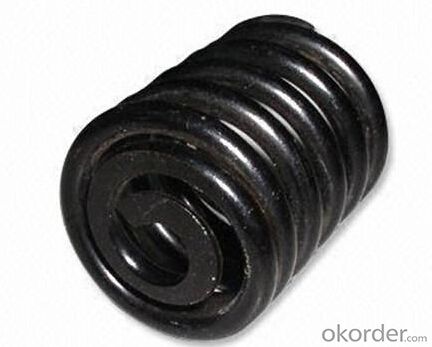
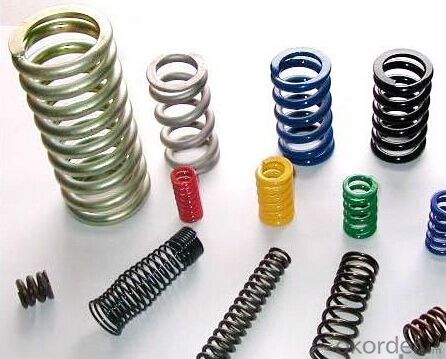
- Q: How does special steel contribute to reducing product costs while maintaining quality?
- Special steel contributes to reducing product costs while maintaining quality through several ways. Firstly, special steel is known for its excellent strength and durability, which allows manufacturers to design products with thinner and lighter components. This reduction in material usage directly leads to cost savings without compromising on quality. Additionally, special steel possesses unique properties such as corrosion resistance, heat resistance, and wear resistance. By using special steel, manufacturers can create products that have a longer lifespan and require less maintenance or replacement. This not only reduces the overall cost of ownership for customers but also enhances the reputation of the brand for delivering reliable and high-quality products. Furthermore, special steel often allows for improved manufacturing processes, such as easier machinability or better weldability, which can result in increased efficiency and reduced production time. These time and cost savings can be passed on to the customers, making the final product more affordable without sacrificing quality. In summary, special steel's strength, durability, unique properties, and improved manufacturing processes contribute to cost reduction while maintaining or even enhancing product quality.
- Q: Can special steel be used in the battery manufacturing industry?
- Yes, special steel can be used in the battery manufacturing industry. Special steel alloys with specific properties, such as high corrosion resistance, high strength, and good conductivity, are often utilized in battery manufacturing. These alloys are utilized in various components of the battery, including terminals, contacts, and current collectors, to enhance the overall performance and efficiency of the battery.
- Q: What are the international standards for special steel?
- The international standards for special steel are a set of guidelines and specifications established by organizations such as the International Organization for Standardization (ISO) and the American Society for Testing and Materials (ASTM). These standards outline the requirements for various properties of special steel, including its chemical composition, mechanical properties, and manufacturing processes. They ensure that special steel products meet the necessary quality and performance criteria for use in industries such as automotive, aerospace, and construction worldwide.
- Q: What are the main applications of special steel in the automotive electrical systems?
- Special steel is commonly used in automotive electrical systems for various applications such as manufacturing electrical connectors, terminals, and wiring harnesses. It offers high conductivity, corrosion resistance, and superior strength, making it an ideal choice for components that require efficient flow of electrical current and durability in harsh environments. Additionally, special steel can also be utilized in the construction of sensors, relays, and other electronic devices within the automotive electrical system, ensuring reliable performance and longevity.
- Q: How is stainless steel used in the food and beverage industry?
- Stainless steel is widely used in the food and beverage industry due to its excellent properties such as corrosion resistance, durability, and hygienic qualities. It is commonly used for manufacturing food processing equipment like tanks, pipes, and storage containers, as well as kitchen appliances and utensils. The non-reactive nature of stainless steel ensures that it does not impart any unwanted taste or odor to the food or beverage being processed or stored, making it a safe and ideal choice for maintaining product quality and safety standards.
- Q: What are the different methods for improving the impact resistance of special steel?
- Special steel can be made more impact resistant through various methods. These methods fall into three main categories: heat treatment, alloying, and surface treatments. Heat treatment is a commonly used method to improve impact resistance. It involves carefully heating and cooling the steel to change its microstructure. Tempering and quenching are the two primary heat treatment processes used for this purpose. Tempering involves heating the steel to a specific temperature and then slowly cooling it. This helps to relieve internal stresses and increase toughness. On the other hand, quenching involves rapidly cooling the steel after heating it to a high temperature. This results in a hardened microstructure, which enhances impact resistance. Alloying is another method to enhance the impact resistance of special steel. By adding specific elements to the base steel, its properties can be improved. For instance, elements like manganese, nickel, or chromium can be added to increase toughness and impact resistance. These alloying elements modify the steel's microstructure, resulting in enhanced strength and resistance to deformation. Surface treatments are used to provide a protective layer on the steel's surface, thereby improving impact resistance. A commonly employed surface treatment is case hardening, which introduces carbon or nitrogen into the outer layer of the steel. This creates a hard surface while maintaining a tough core, resulting in improved impact resistance. Another surface treatment method is shot peening, where the steel surface is bombarded with small particles under high pressure. This induces compressive stresses in the surface layer, enhancing fatigue and impact resistance. In summary, the impact resistance of special steel can be improved through different methods, including heat treatment, alloying, and surface treatments. These methods can be applied individually or in combination to enhance the steel's mechanical properties, making it more resistant to impact and deformation.
- Q: What are the different corrosion testing methods used for special steel?
- To assess and evaluate the resistance of special steel against corrosion, various testing methods are utilized. These include: 1. Salt Spray Testing: This method involves subjecting the special steel to a controlled mist of saltwater. The steel specimen is placed in a chamber where it is exposed to the mist for a specific duration. The resulting corrosion is visually evaluated and compared to established criteria. 2. Electrochemical Testing: To study the corrosion behavior of special steel, electrochemical techniques like potentiodynamic polarization and electrochemical impedance spectroscopy (EIS) are commonly employed. These methods measure the steel's current and potential responses in different corrosive solutions, providing information on corrosion rate and other electrochemical parameters. 3. Immersion Testing: In this method, the special steel is immersed in a specific corrosive solution for a predetermined period. The solution can be acidic, alkaline, or even simulated seawater, depending on the intended application. The corrosion-induced weight loss or surface damage is then measured and compared to assess the steel's corrosion resistance. 4. Crevice Corrosion Testing: This technique focuses on evaluating the susceptibility of special steel to crevice corrosion, which occurs in confined spaces or gaps. By creating a crevice between the steel specimen and another material and introducing a corrosive solution, the severity of crevice corrosion can be assessed. This can be done by measuring the depth of attack or using electrochemical methods. 5. Intergranular Corrosion Testing: Special steel is sometimes prone to intergranular corrosion, which occurs along the grain boundaries. Tests like the Strauss test or the Huey test are conducted to determine the steel's susceptibility to this form of corrosion. These tests involve immersing the steel in a corrosive solution at elevated temperatures and assessing the extent of intergranular attack. 6. Accelerated Testing: Accelerated corrosion testing methods aim to simulate the long-term effects of corrosion within a shorter time frame. Techniques like cyclic corrosion testing, which involve alternating exposure to different corrosive environments, can provide valuable insights into the steel's performance under realistic conditions in a shorter period. It should be noted that the selection of the corrosion testing method depends on the specific requirements, intended application, and environmental factors to which the special steel will be exposed.
- Q: What are the common alloying elements in special steel?
- Special steel commonly contains alloying elements such as chromium, nickel, molybdenum, and vanadium. The addition of chromium improves the steel's resistance to corrosion and increases its hardness. Nickel is utilized to enhance the steel's toughness and ability to withstand extreme temperatures. Molybdenum is frequently incorporated to strengthen the steel and improve its resistance to wear and corrosion. Vanadium, on the other hand, is recognized for its capability to increase the steel's hardness and strength, making it ideal for applications that necessitate high durability. These alloying elements are meticulously chosen and included in special steel to attain specific properties and fulfill the distinctive demands of various industries including automotive, aerospace, and construction.
- Q: What are the different casting methods used for special steel?
- There are several different casting methods used for special steel, including sand casting, investment casting, continuous casting, and centrifugal casting. Each method has its own advantages and is suited for specific applications. Sand casting is a common and cost-effective method that involves pouring molten steel into a sand mold. Investment casting, on the other hand, uses a wax pattern that is coated in a ceramic shell and then melted away to leave a cavity for the steel to be poured into. Continuous casting is a continuous process where molten steel is poured into a water-cooled mold and solidifies into a continuous strand. Finally, centrifugal casting involves spinning a mold while pouring the molten steel, creating a centrifugal force that helps distribute the metal evenly. These different methods allow for the production of special steel components with various sizes, shapes, and properties.
- Q: What are the main properties of special steel?
- The main properties of special steel include high strength, excellent corrosion resistance, superior heat resistance, good toughness, and exceptional wear resistance. Additionally, special steel often exhibits high ductility, machinability, and weldability, making it suitable for various applications in industries such as automotive, aerospace, and construction.
Send your message to us
Compression Spring Heavy Duty with Stainless Steel
- Loading Port:
- China Main Port
- Payment Terms:
- TT or LC
- Min Order Qty:
- 50 m.t.
- Supply Capability:
- 1000 m.t./month
OKorder Service Pledge
OKorder Financial Service
Similar products
Hot products
Hot Searches
Related keywords
